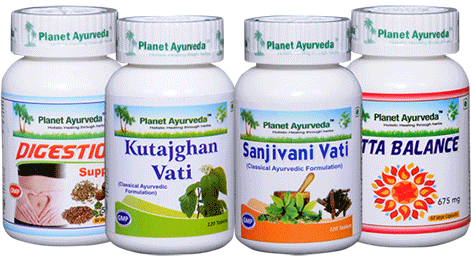All About Farts as Per Medical View – Treatment of Digestive Disorders
Abstract
Indigestion – known as dyspepsia or an disturbed stomach- is discomfort in the human abdomen. Indigestion defines various symptoms such as smelly farts, lower abdominal pain, acid reflux, heartburn, constipation and bleeding. In this article we will discuss all about farts, its possible symptoms, causes, why do we have these, ayurvedic point of view on farts and herbal formulations which are proposed by Planet Ayurveda for the treatment of smelly farts The average person forms 0.6 – 1.8 liters of intestinal gas per day. Various scientific studies have found that there is no significant difference between the concentration that younger and older people fart. In addition, there is no remarkable difference between the sexes.
Introduction
A fart, generally known as flatulence or gas, is an accumulation of gasses within the small intestine from respiration and digestion. It is considered a normal part of how the body functions and oftentimes not a health concern. Normally, farts are noiseless and considerable. Apart from this, they can be smelly and loud. A person may experience some pressure and bloating before discharging gas. A typical fart is buildup of various gasses, most are not smelly. The smell is caused by sulfur compounds, which are present in eggs and some vegetables. There are various other foods and medications that can affect how much and how foul- smelly gas is in the digestive tract.

What are the symptoms of farts or flatulence?
Releasing wind is common, but the concentration varies between individuals and based on a number of different factors including diet. Some people release wind only a few times per day, others up to 35 to 40 times, while the average quantity seems to be about 15. Symptoms of overmuch flatulence or farts may include:
- Foul smell of flatus
- Discomfort and abdominal distension
- Loud farts
- Releasing wind often
- Rumbles in the lower abdomen
Why do we fart?
The body forms intestinal gas as part of the performance of digestion. Once this gas is inside in the body, it requires to be released by anyhow. Farts are mostly thrown out from the anus or passed through the mouth as a burp. Some intestinal gases come about from the air that people swallow when they are drinking through a straw, smoking, chewing or eating. Oxygen, carbon dioxide and nitrogen are external gases that are found inside the body and are known as exogenous air. On the other hand, intestinal gas forms in the body when bacteria in the colon disrupt the food and is called endogenous gas. Undigested food items are the main cause of foul-smelling flatulence.
Causes of farts
Causes of smelly farts can vary from harmless to serious illness. It may not be easier to determine what is behind foul smelling flatulence due to the number of probable causes. Various reasons for this condition revolve around medication and food. Moreover, some causes may represent an underlying health issue. The following are most common cause of smelly farts:
1. Heavy consumption of fiber rich food
High fiber food is difficult to digest. Despite the fact that it is good for people’s overall health. Gradual digesting foods breakdown and ferment in the digestive system. The fermentation process forms odor gas. Some high fiber food contains sulfur compounds which may affect odor. Foods which may cause odors are
- Broccoli
- Asparagus
- Cabbage
- Garlic
2. Intolerance to food
Food tolerance is the most general cause of stink odor farts. Average conditions that can affect smelly farts include gluten and lactose intolerances. In these conditions, the body’s inability to disintegrate gluten or lactose causes foul gas to create and immediately be passed. There are various people who may have food intolerance due to disorders such as celiac disease.
3. Constipation
It is produced when stool accumulates in the colon or large intestine and can have no way out. This happens due to taking some medications, unhealthy diet and other biological factors. The formation of stool in the colon often causes smelly gases. This excessive gas may cause discomfort and bloating. When ultimately passed, the gas is sometimes smelly.
4. Medications
One of the most culprits is antibiotics which may destroy some of the healthy or good bacteria in the digestive system while they work to demolish an infection. The discharging of good bacteria affects an imbalance in the digestive system. These imbalances can cause a person to form bad smelly gas. It is also causing constipation and bloating
5. Colon cancer
Although not as usual, a person may undergo excessive smelly flatulence due to the presence of cancer in the colon. Cancerous polyps or tumors can create blockages that cause gas to form in the intestine.
6. Infections and Bacteria
The digestive tract manages the breakdown of foods into essential nutrients, which are involved in the blood. It also forms waste, which is released through the colon. The digestive tract depends on various components to do this, including its native good bacteria. Sometimes, the levels of bacteria in the digestive system may become damaged, leading to an infection.
The infection will sometimes cause
- Nausea
- Fatigue
- Vomiting
- Foul smelly gas
- Diarrhea
- Pain in the abdomen
- Fever
Here are some healthy tips which are helpful to avoid excessive gas may include:
- Stop eating naturally smelly foods
- Avoid carbonated drinks
- Eat in smaller portions
- Avoid trigger foods
- Drink plenty of water
- Limit yoghurt and foods with probiotics.
- Less consume high fiber rich foods
- Limit consumption of apple,pear, peach apricot
- Avoid consuming legumes such as soybeans, nuts, peas, beans and chickpeas.
Ayurvedic Aspects of flatulence or farts
As per ayurveda, farts or flatulence are known as Anaha. This condition is produced due to imbalance of Vata dosha which is characterized by scanty defecation, occasional breathing disorders and stiffness in the lower abdomen. Planet ayurveda is an ayurvedic company which provides various herbal remedies which are helpful for the treatment of smelly farts and other digestive disorders. These products are prepared under the guidance of MD experts by following proper guidelines and principles of ayurveda. These herbal products are pure or vegetarian and safer for use. Here we are discussing about herbal products by Planet Ayurveda:
1. Agnitundi Vati
-It is a digestion pack offered by planet ayurveda which is helpful in indigestion. These herbal capsules are formulated by using pure extracts of Jeerak (Cuminum cyminum), Ginger (zingiber officinale), Triphala ( Emblica officinalis, terminalia chebula and terminalia bellirica) which are advantageous to lower acidity problems and some other stomach issues. These excellent herbs are controlling flatulence and heartburn.
Dosage- 2 capsules three times daily with warm water, after meals.
2. Draksha Avaleha
Planet Ayurveda Draksha Avaleha (Grape saffron jam) beneficial to cure all stomach disorders and is prepared with the help of various herbs like Draksha (Vitis vinifera), Shunthi (zingiber officinale), pippali (Piper longum), Yasthimadhu (Glycyrrhiza glabra) and many more.
Dosage – One teaspoonful of draksha avaleha two times everyday, it can be taken with warm milk.
3. Digestion support
This herbal remedy contains excellent properties which are helpful for the treatment of digestive disorders It improves the appetite, digestion, constipation, balance pH level and improves digestion. Digestion support is prepared by using natural ingredients such as bahera(Terminalia billerica), dhania (coriander sativum), jeerak (cyminum cuminum),sounf(Foeniculum vulgare) and many others. Planet Ayurveda offers these herbal capsules to treat flatulence, gas, reduce gastric acid and constipation.
Dosage – 2 capsules 2 times a day with warm water, after meals.
Conclusion
Indigestion is a common health condition which can be characterized by hyperacidity, pain in abdomen, discomfort, constipation, burps and heartburn. Planet Ayurveda provides the best herbal remedy for the treatment of these health issues as we discussed previously. As per ayurveda, a healthy diet plays an essential role to keep us healthy and active. Our body needs healthy nutrients because they help to protect us from serious illness. Try to follow Planet Ayurveda’s healthy diet tips and above mentioned products to cure smelly farts and other stomach problems.



